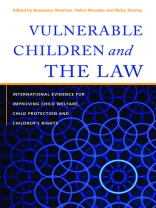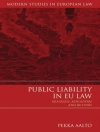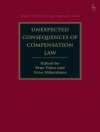Global support for improving child welfare and upholding the rights of children is strong, but in practice often fails to recognise the emerging gap between traditional child welfare practices and the evolving nature of child vulnerability.
This book takes an international perspective on child welfare, examining how global and national frameworks can be adapted to address the rights and best interests of children. Synthesising the latest international research, experts redefine the concept of a ’child in need’ in a world where global movement is common and children are frequently involved in the law. The book considers children as citizens, as refugees, victims of trafficking, soldiers, or members of indigenous groups and identifies the political and cultural changes that need to take place in order to deliver rights for these children. Focusing in particular on child protection systems across nations, it identifies areas of child welfare and family law which systematically fail to look after the best interests of children, often through prejudice, outdated practice, or even the failure of agencies to work together.
Exploring the nexus between children’s rights and the law across the globe, this book makes essential reading for policymakers, social workers, lawyers, researchers and professionals involved in protecting vulnerable children.
Innehållsförteckning
Preface and acknowledgements. Introduction. Rosemary Sheehan, Monash University, Australia, Helen Rhoades, University of Melbourne, Australia and Nicky Stanley, University of Central Lancashire, UK. Part 1. Children and citizenship. 1. Children’s rights: the effective implementation of rights and standards. Deena Haydon, Queen’s University, Belfast, UK. 2. Child protection in humanitarian emergencies. Patrick O’Leary, University of Bath, UK and Jason Squire, Terres des hommes Foundation. 3. Children in the shadows: Child trafficking in the UK. Christine Beddoe, ECPAT UK. 4. Child combatants, peace processes: Challenges of inclusion and exclusion. Shelly L. Whitman, Dalhousie University, Canada. 5. Unaccompanied children as illegal immigrants in the United States. Gladis E. Molina, Florence Immigrant and Refugee Rights Project (FIRRP), USA. 6. Protecting the rights of children in custody, Una Convery and Linda Moore, University of Ulster, UK. Part 2. Indigenous and non-national children and vulnerability. 7. The victimisation of indigenous children. Suzanne Oliver, Northern Territory Stipendiary Magistrate, Australia. 8. Non-national children and vulnerability: The child protection context. Goos Cardol, Zuyd University of Applied Sciences, The Netherlands. 9. Mana tamariki, takahi tamariki: Maori child pride, Maori child abuse. Rawiri Taonui, University of Canterbury, New Zealand. 10. Indigenous human rights law and the needs of indigenous children. Terri Libesman, University of Technology, Sydney, Australia. Part 3. Child welfare and family identity. 11. High frequency parental contact for infants in care: whose rights are being served? Cathy Humphreys and Meredith Kiraly, University of Melbourne, Australia. 12. Maternal incest: Challenges for child protection. Jackie Turton, University of Essex, UK. 13. Lost identities: denying children their family identity. James Reid, University of Huddersfield, UK. 14. Should adoption be an option? Greg Kelly and Chaitali Das, Queen’s University Belfast, UK. Part 4. Child welfare and legal intervention. 15. Child protection family law: The Australian experience. Lisa Young, Murdoch University, Australia. 16. The police role in identifying and responding to children experiencing domestic violence. Nicky Stanley, Pam Miller, NSPCC, Helen Richardson-Foster, University of Sheffield, UK and Gill Thomson, University of Central Lancashire, UK. 17. Relocation of children in family law disputes. Robert H. George, University of Oxford, UK. 18. Working with separated families. Helen Rhoades. 19. Deciding the best interests of the child: Legal responses to child protection concerns. Rosemary Sheehan. 20. Conclusion. Rosemary Sheehan, Helen Rhoades and Nicky Stanley.
Om författaren
Cathy Humphreys is a senior lecturer in Health and Social Work at the University of Warwick. She has worked as a practitioner, researcher and educator in domestic violence and child abuse. Catherine’s other research areas include substance misuse, mental health, outreach and advocacy services for both women and children, and child contact.












